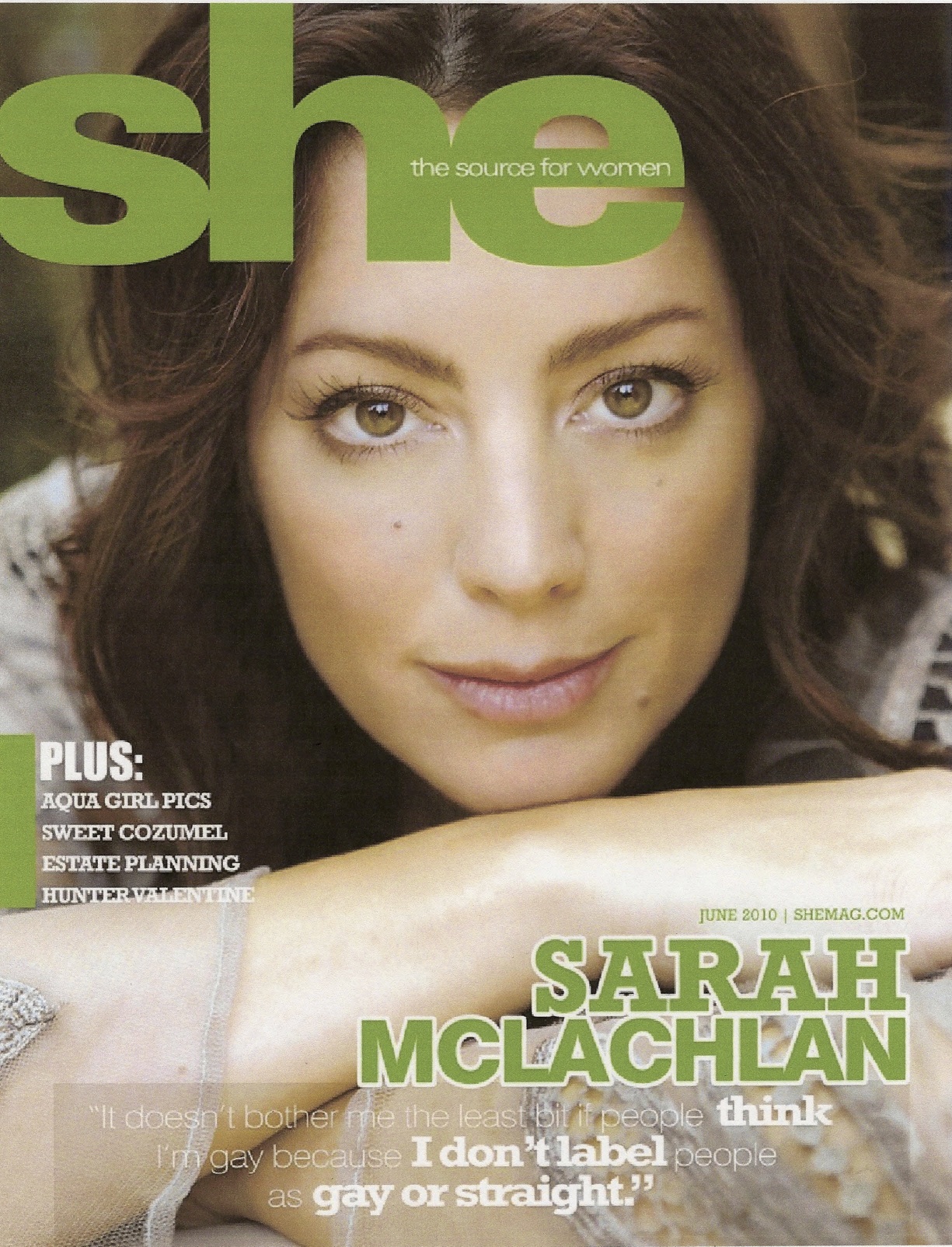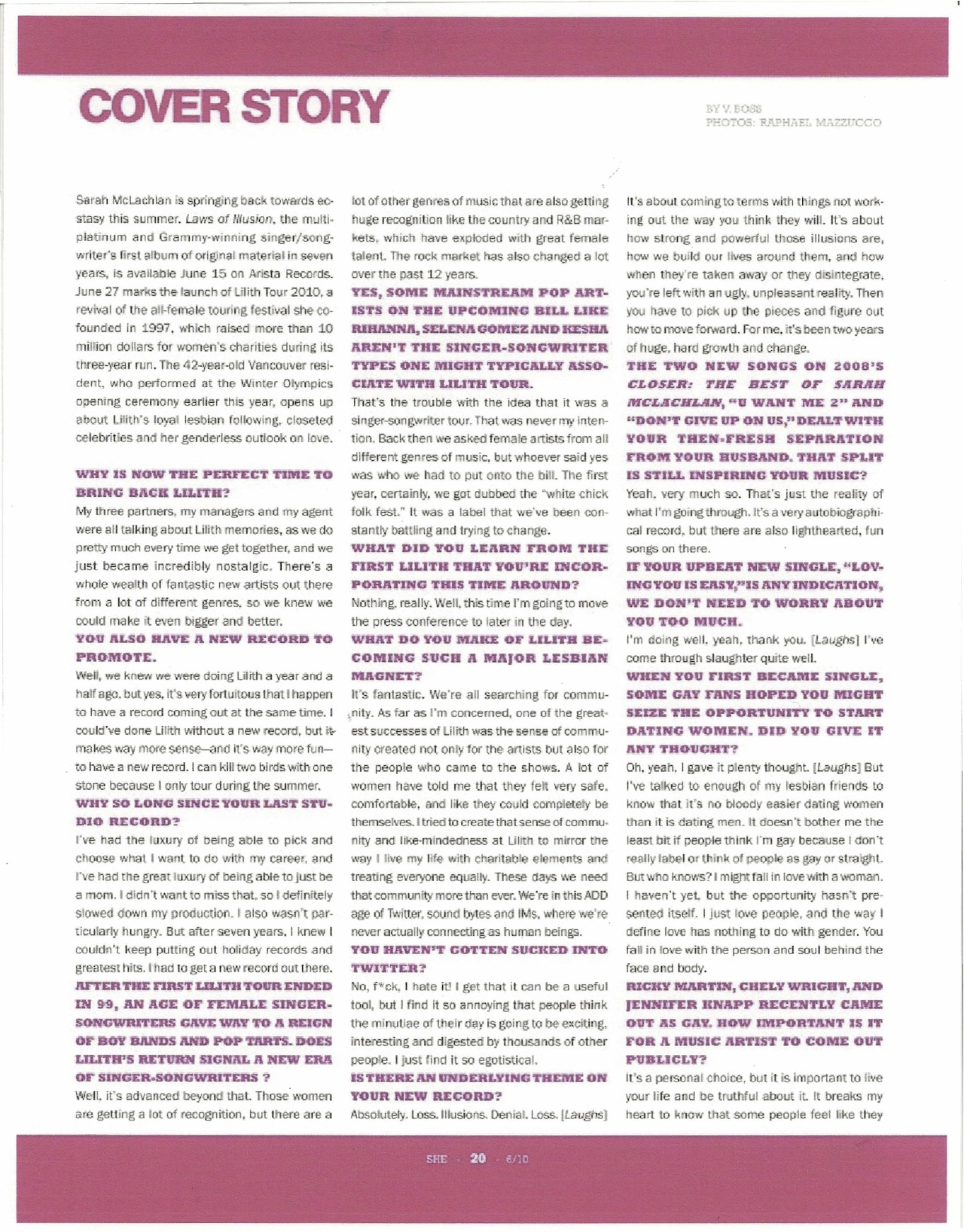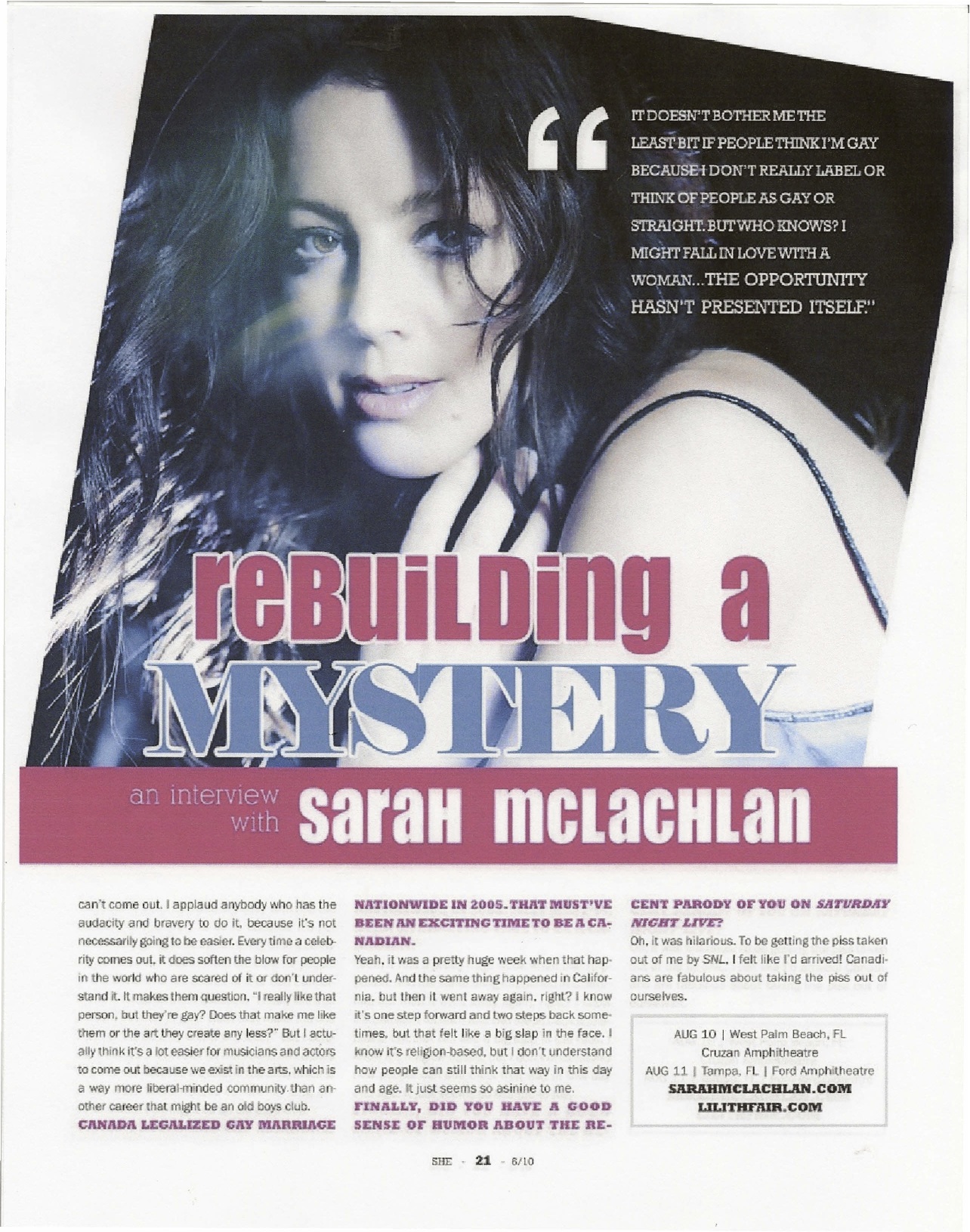


Sarah McLachlan resurfaces with the return of Lilith Tour and her first new studio album in seven years, but don’t expect to find her on Twitter anytime soon.
By Brandon Voss
Sarah McLachlan is springing back towards ecstasy this summer. Laws of Illusion, the multi-platinum and Grammy-winning singer-songwriter’s first album of original material in seven years, is available June 15 on Arista Records; June 27 marks the launch of Lilith Tour 2010, a revival of the all-female touring festival she co-founded in 1997, raising more than 10 million dollars for women’s charities during its three-year run. The 42-year-old Vancouver resident, who performed at the Winter Olympics opening ceremony earlier this year, opens up about Lilith’s loyal lesbian following, closeted celebrities, and her genderless outlook on love.
She: Why is now the perfect time to bring back Lilith Tour?
Sarah McLachlan: My three partners, my managers, and my agent were all talking about Lilith memories, as we do pretty much every time we get together, and we just became incredibly nostalgic. There’s a whole wealth of fantastic new artists out there from a lot of different genres, so we knew we could make it even bigger and better.
You also have a new record to promote.
Well, we knew we were doing Lilith a year and a half ago, but yes, it’s very fortuitous that I happen to have a record coming out at the same time. I could’ve done Lilith without a new record, but it makes way more sense — and it’s way more fun — to have a new record. I can kill two birds with one stone because I only tour during the summer.
Why so long since your last studio record?
I’ve had the luxury of being able to pick and choose what I want to do with my career, and I’ve had the great luxury of being able to just be a mom. I didn’t want to miss that, so I definitely slowed down my production. I also wasn’t particularly hungry. But after seven years, I knew I couldn’t keep putting out holiday records and greatest hits. I had to get a new record out there.
After the first Lilith ended in 1999, an age of female singer-songwriters gave way to a reign of boy bands and pop tarts. Does Lilith’s return signal a new era of singer-songwriters like Lilith 2010 participants Colbie Caillat, Ingrid Michaelson, and Sara Bareilles?
Well, it’s advanced beyond that. Those women are getting a lot of recognition, but there are a lot of other genres of music that are also getting huge recognition like the country and R&B markets, which have exploded with great female talent. The rock market has also changed a lot over the past 12 years.
Yes, some mainstream pop artists on the upcoming bill — like Rihanna, Selena Gomez, and Ke$ha — aren’t the singer-songwriter types one might typically associate with Lilith.
That’s the trouble with the idea that it was a singer-songwriter tour. That was never my intention. Back then we asked female artists from all different genres of music, but whoever said yes was who we had to put onto the bill. The first year, certainly, we got dubbed the “white chick folk fest.” It was a label that we’ve been constantly battling and trying to change.
Do you have any personal favorites on the new tour?
I’m very excited about the Go-Gos, Loretta Lynn, and Mary J. Blige. I’m also excited about Cat Power, Tegan and Sara…
OK, now you’re just listing everybody.
[Laughs] Well, yeah, we have some really great artists! It’s pretty cool.
What did you learn from the first Lilith that you’re incorporating this time around?
Nothing, really. Well, this time I’m going to move the press conference later in the day.
What do you make of Lilith becoming such a major lesbian magnet?
It’s fantastic. We’re all searching for community. As far as I’m concerned, one of the greatest successes of Lilith was the sense of community created not only for the artists but also for the people who came to the shows. A lot of women have told me that they felt very safe, comfortable, and like they could completely be themselves. I tried to create that sense of community and like-mindedness at Lilith to mirror the way I live my life with charitable elements and treating everyone equally. These days we need that community more than ever. We’re in this ADD age of Twitter, sound bytes, and IMs, where we’re never actually connecting as human beings.
You haven’t gotten sucked into Twitter?
No, fuck, I hate it! I get that it can be a useful tool, but I find it so annoying that people think the minutiae of their day is going to be exciting, interesting, and digested by thousands of other people. I just find it so egotistical.
Is there an underlying theme on your new record?
Absolutely. Loss. Illusions. Denial. Loss. [Laughs] It’s about coming to terms with things not working out the way you think they will. It’s about how strong and powerful those illusions are, how we build our lives around them, and how when they’re taken away or they disintegrate, you’re left with an ugly, unpleasant reality. Then you have to pick up the pieces and figure out how to move forward. For me, it’s been two years of huge, hard growth and change.
The two new songs on 2008’s Closer: The Best of Sarah McLachlan, “U Want Me 2” and “Don’t Give Up on Us,” dealt with your then-fresh separation from your husband. That split is still inspiring your music?
Yeah, very much so. That’s just the reality of what I’m going through. It’s a very autobiographical record, but there are also lighthearted, fun songs on there.
If your upbeat new single, “Loving You is Easy,” is any indication, we don’t need to worry about you too much.
I’m doing well, yeah, thank you. [Laughs] I’ve come through slaughter quite well.
When you first became single, some gay fans hoped you might seize the opportunity to start dating women. Did you give it any thought?
Oh, yeah, I gave it plenty thought. [Laughs] But I’ve talked to enough of my lesbian friends to know that it’s no bloody easier dating women than it is dating men. It doesn’t bother me the least bit if people think I’m gay because I don’t really label or think of people as gay or straight. But who knows? I might fall in love with a woman. I haven’t yet, but the opportunity hasn’t presented itself. I just love people, and the way I define love has nothing to do with gender. You fall in love with the person and soul behind the face and body.
Ricky Martin, Chely Wright, and Jennifer Knapp recently came out as gay. How important is it for a music artist to come out publicly?
It’s a personal choice, but it is important to live your life and be truthful about it. It breaks my heart to know that some people feel like they can’t come out. I applaud anybody who has the audacity and bravery to do it, because it’s not necessarily going to be easier. Every time a celebrity comes out, it does soften the blow for people in the world who are scared of it or don’t understand it. It makes them question, “I really like that person, but they’re gay? Does that make me like them or the art they create any less?” But I actually think it’s a lot easier for musicians and actors to come out because we exist in the arts, which is a way more liberal-minded community than another career that might be an old boys club.
Canada legalized gay marriage nationwide in 2005. That must’ve been an exciting time to be a Canadian.
Yeah, it was a pretty huge week when that happened. And the same thing happened in California, but then it went away again, right? I know it’s one step forward and two steps back sometimes, but that felt like a big slap in the face. I know it’s religion-based, but I don’t understand how people can still think that way in this day and age. It just seems so asinine to me.
Finally, did you have a good sense of humor about the recent parody of you on Saturday Night Live?
Oh, it was hilarious. To be getting the piss taken out of me by SNL, I felt like I’d arrived! Canadians are fabulous about taking the piss out of ourselves.
She, June 2010 issue.
